ASA testifies before USTR on ag’s concerns over China shipbuilding investigation
ASA testifies before USTR on ag’s concerns over China shipbuilding investigation

The American Soybean Association testified before the United States Trade Representative March 24 on the office’s Section 301 investigation into China’s targeting of the Maritime, Logistics, and Shipbuilding Sectors for Dominance. Director Mike Koehne’s voice before USTR was especially significant because ASA was the only agriculture commodity group represented in which testimony specifically addressed concerns about the direct impacts of the proposal on U.S. agriculture.
In addition to serving on the ASA Board of Directors, Koehne, an Indiana farmer, sits on the U.S. Soybean Export Council board and is chairman of the Soy Transportation Coalition. Minnesota Soybean also has representation on both boards: Joel Schreurs, a director with the Minnesota Soybean Growers Association and Minnesota Soybean Research & Promotion Council, sits on USSEC, while Council Director Joe Serbus serves on STC.
Koehne, a first-generation farmer, shared how he is personally dependent on maritime commerce, explaining that some of his crops are shipped by barge down the Ohio River before ending up on a bulk vessel in the Gulf. The soybeans he grows are shipped by container because they are premium-based commodities – specialty products based specifically on their export markets, namely Japan and Taiwan. Minnesota is also the nation’s top producer of speciality soybeans.
“With its inland waterways, rail and roadways, I believe our transportation system is our competitive edge. ASA supports the goal of increasing domestic shipbuilding capacity to aid in the export of U.S. agriculture. However, the proposed solution offered by USTR in this investigation creates unintended consequences for soybean farmers like me. We have already seen negative impacts on the futures prices for soybeans because of market reactions to this proposal,” Koehne explained in verbal testimony.
One of the greatest determining factors for U.S. soybean prices is the landed price of goods in destination markets. The landed price includes the cost of goods (such as soybeans), insurance and freight. USTR’s proposed solution to counter China’s shipbuilding industry would significantly increase freight rates for U.S. soy and soy products, in turn making the landed price of U.S. soy products less desirable compared to beans from Brazil and Argentina – U.S. soy’s largest competitors in the export market.
America’s agriculture producers are already suffering from a down farm economy. While ASA supports efforts to boost American manufacturing and develop a thriving domestic maritime economy, farmers cannot take on the additional financial burden USTR’s remedies, as proposed, would inflict. In 2024, the U.S. exported $191 billion in U.S. agricultural and related products. More than 70 percent of the ag exports were waterborne and moved by vessels through 29 customs districts and numerous ports.
Koehne connected the dots on what the USTR plan would mean for soy prices.
“Imposing port fees on most of the maritime fleet that exports from and imports to the U.S. will increase costs for U.S. farmers – both in terms of inputs like fertilizer, seed, etc., and getting crops to market,” he said. “At the same time, our competitors in Brazil and Argentina will not be subject to the same regulations. While well-intended, this proposal would ensure U.S. soybeans will bear higher costs and be less competitive in the global marketplace.”
As the No. 1 agriculture export in the U.S., soybean farmers rely on an efficient maritime commerce system to move their crop to market. Soybeans are also Minnesota’s top ag export, valued at over $2 billion annually, and about one in every rows of Minnesota’s soybeans is shipped to China. ASA and MSGA urge USTR to work with domestic industries to set long-term goals that increase U.S. maritime competitiveness without negatively impacting U.S. agriculture.
“We believe in producing American-made ships, but we’re extremely concerned about the short and long-term effects,” MSGA President Darin Johnson told legislative staffers during ASA’s March 2025 Hill Visits. “The ramifications could really hurt farmers at a time when we can’t afford to lose any of our export markets.”
In response to the proposal, MSGA joined over 300 advocacy organizations in submitting comments to USTR.


